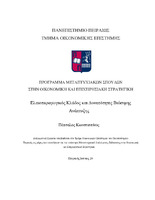Ελαιοπαραγωγικός κλάδος και δυνατότητες βιώσιμης ανάπτυξης
Olive oil sector and possibilities of sustainable development

Προβολή/
Λέξεις κλειδιά
Βιωσιμότητα ; Βιώσιμη ανάπτυξη ; Ελαιοπαραγωγικός κλάδοςΠερίληψη
Στην παρούσα μεταπτυχιακή διατριβή εξετάζεται ο ελαιοπαραγωγικός κλάδος στην Ελλάδα, χώρες της ΕΕ καθώς και μερικούς νέες ελαιοπαραγωγικές χώρες εκτός του Μεσογειακού χώρου όπου η ελιά είναι ευρύτατα διαδεδομένη από την εποχή του Χαλκού. Κύριο ενδιαφέρον είναι η βιωσιμότητα των διαδικασιών του ελαιοπαραγωγικού κλάδου, τα υποπροϊόντα που δημιουργεί και οι ενέργειες που πρέπει να γίνουν για περαιτέρω μείωση του περιβαλλοντικού αποτυπώματος που έχει ο κλάδος, δίχως να θυσιαστεί η κοινωνική του προσφορά σε προϊόντα και θέσεις εργασίας.
Αφού περιγραφούν συνοπτικά οι παραγωγικές διαδικασίες της καλλιέργειας του ελαιοκαρπού και της μεταποίησής του σε ελαιόλαδο, και πώς αυτές έχουν εξελιχθεί τα τελευταία χρόνια, γίνεται ανάλυση των διαφόρων εισροών και εκροών που δημιουργούν, ποιες διαδικασίες είναι οι πιο ρυπογόνες και πώς επηρεάζεται το περιβάλλον από αυτά. Τα στοιχεία αυτά προκύπτουν από πολλαπλές αξιολογήσεις κύκλου ζωής. Γίνεται διασταύρωση στοιχείων από πολλαπλές χώρες και διαφορετικές μεθόδους καλλιέργειας, αποκτώντας έτσι μία καλή εικόνα για τα πλεονεκτήματα των συγχρόνων μεθόδων καλλιέργειας, συσκευασίας, προτυποποίησης και διανομής του ελαιόλαδου, αλλά και των εκάστοτε περιβαλλοντικών επιπτώσεων.
Οι αρχές της βιώσιμης ανάπτυξης ορίζουν ένα πλαίσιο βάσει του οποίου πρέπει να προσαρμόσουμε τις ανθρώπινες παραγωγικές, οικονομικές και κοινωνικές δραστηριότητες, με στόχο μία αειφόρο λειτουργία της, δίχως επιβάρυνση του περιβάλλοντος και καταργώντας κοινωνικές ανισότητες, δίνοντας τη δυνατότητα ανάπτυξης υγιών και ασφαλών κοινωνιών. Πραγματοποιείται περιγραφή των 17 Στόχων για την Βιώσιμη Ανάπτυξη όπως αυτοί ορίστηκαν από τον ΟΗΕ στην Ατζέντα 2030 για την βιώσιμη ανάπτυξη, δίνοντας μεγαλύτερη έμφαση στους στόχους οι οποίοι θεωρούνται άμεσα εφαρμόσιμοι στον ελαιοπαραγωγικό τομέα.
Η εργασία ολοκληρώνεται εξετάζοντας τα δεδομένα που κοινοποιούν σήμερα μεγάλες ελαιοπαραγωγικές εταιρείες σε όλο τον πλανήτη στις ιστοσελίδες τους και σε εκθέσεις βιωσιμότητας, παρατηρώντας τις ενέργειες που υλοποιούνται σήμερα, οι τομείς στους οποίους υπάρχει εξέλιξη ή στασιμότητα και τα αποτελέσματα αυτών των προσπαθειών. Σημαντική είναι η αναγνώριση των στοιχείων Greenwashing που υπάρχουν σε όλα αυτά τα κείμενα και την αντικειμενική αξία που αυτά πραγματικά προσφέρουν, παρά την χρήση τους για την προώθηση των συμφερόντων μίας κερδοσκοπικής εταιρείας.


